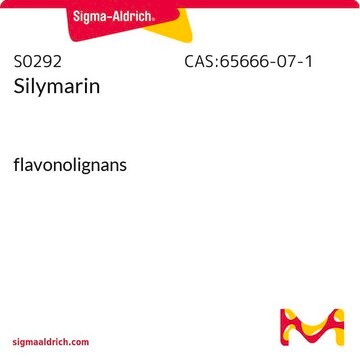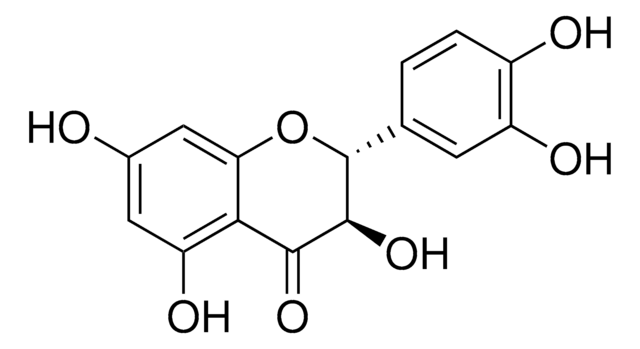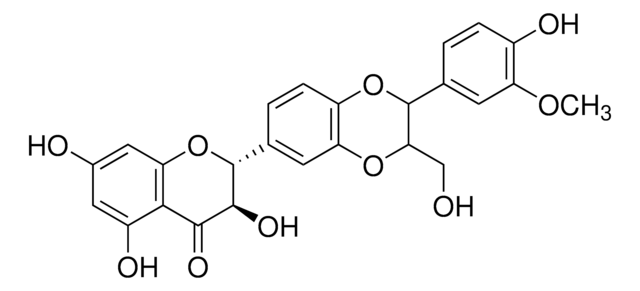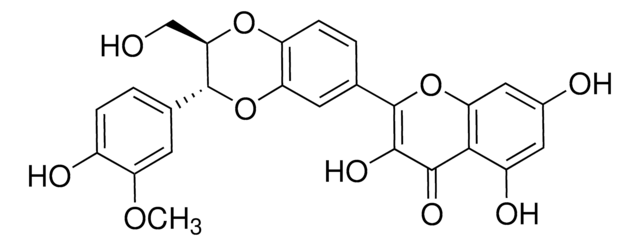S0417
Silibinin
≥98% (HPLC)
Synonym(e):
2,3-Dihydro-3-(4-hydroxy-3-methoxyphenyl)-2-(hydroxymethyl)-6-(3,5,7-trihydroxy-4-oxobenzopyran-2-yl)benzodioxin, Silybin
About This Item
Empfohlene Produkte
Qualitätsniveau
Assay
≥98% (HPLC)
Lagertemp.
−20°C
SMILES String
COc1cc(ccc1O)[C@@H]2Oc3cc(ccc3O[C@H]2CO)[C@H]4Oc5cc(O)cc(O)c5C(=O)[C@H]4O
InChI
1S/C25H22O10/c1-32-17-6-11(2-4-14(17)28)24-20(10-26)33-16-5-3-12(7-18(16)34-24)25-23(31)22(30)21-15(29)8-13(27)9-19(21)35-25/h2-9,20,23-29,31H,10H2,1H3/t20-,23+,24-,25?/m0/s1
InChIKey
SEBFKMXJBCUCAI-ILJKEPSESA-N
Suchen Sie nach ähnlichen Produkten? Aufrufen Leitfaden zum Produktvergleich
Allgemeine Beschreibung
Anwendung
- to study its effect on gene expression levels of various proteins involved in chromatin regulations of prostate cancer, by real time polymerase chain reaction (RT-PCR)
- to study its effect on cell proliferation in platelet-derived growth factor (PDGF)-treated human tenon′s fibroblasts (HTFs) by investigating the expression of proliferating cell nuclear antigen (PCNA) and by water-soluble tetrazolium salt (WST-1) assay
- to examine its effect on gene expression levels of stromelysine 1 (STM1), acetyl hexoseamines and collagen production during skin wound healing
- to study its inhibitory effect on Escherichia coli ATP synthase
Biochem./physiol. Wirkung
Komponenten
Signalwort
Warning
H-Sätze
Gefahreneinstufungen
Acute Tox. 4 Oral
Lagerklassenschlüssel
11 - Combustible Solids
WGK
WGK 2
Flammpunkt (°F)
Not applicable
Flammpunkt (°C)
Not applicable
Persönliche Schutzausrüstung
dust mask type N95 (US), Eyeshields, Gloves
Analysenzertifikate (COA)
Suchen Sie nach Analysenzertifikate (COA), indem Sie die Lot-/Chargennummer des Produkts eingeben. Lot- und Chargennummern sind auf dem Produktetikett hinter den Wörtern ‘Lot’ oder ‘Batch’ (Lot oder Charge) zu finden.
Besitzen Sie dieses Produkt bereits?
In der Dokumentenbibliothek finden Sie die Dokumentation zu den Produkten, die Sie kürzlich erworben haben.
Kunden haben sich ebenfalls angesehen
Unser Team von Wissenschaftlern verfügt über Erfahrung in allen Forschungsbereichen einschließlich Life Science, Materialwissenschaften, chemischer Synthese, Chromatographie, Analytik und vielen mehr..
Setzen Sie sich mit dem technischen Dienst in Verbindung.